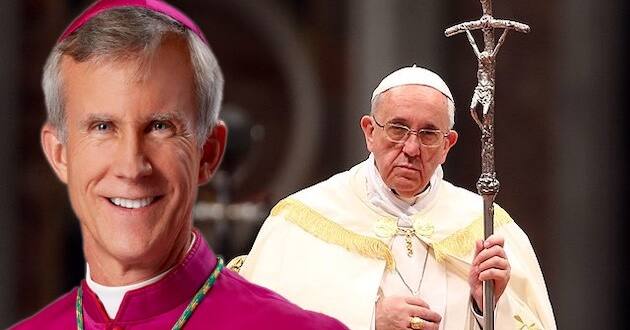The Pope fires conservative Texas bishop who criticized him

Pope Francis on Saturday removed the conservative bishop of Tyler, Texas, who has criticized the pope as too liberal on social issues.
Bishop Joseph Strickland has emerged as a leading critic of Francis, accusing him in a tweet earlier this year of “undermining the deposit of faith.” He has been particularly critical of Francis’ recent meeting on the future of the Catholic Church during which hot-button issues were discussed, including incorporating LGBTQ individuals into Catholic worship services.
Earlier this year, the Vatican sent investigators to look into his governance of the diocese, amid reports that priests and laypeople in Tyler had complained and that he was making unorthodox claims. The Vatican never released the findings and Strickland had insisted he wouldn’t resign voluntarily, saying in media interviews that he was given a mandate to serve as bishop in 2012 by the late Pope Benedict XVI and couldn’t abdicate that responsibility.
“LifeSiteNews,” which said it interviewed Strickland on Saturday, quoted him as saying one of the reasons given for his ouster was his refusal to implement Francis’ 2021 restrictions on celebrating the old Latin Mass. Francis’ crackdown on the old liturgy has become a rallying cry for traditionalist Catholics opposed to the pontiff’s progressive bent.
The firing sparked an immediate outcry among some conservatives and traditionalists who had held up Strickland as a leading point of Catholic reference to counter Francis’ progressive reforms. Michael J. Matt, editor of the traditionalist newspaper “The Remnant,” wrote that with the firing, Francis was “actively trying to bury fidelity to the Church of Jesus Christ.”
“This is total war,” Matt wrote on X, formerly Twitter. “Francis is a clear and present danger not only to Catholics the world over but also to the whole world itself.”
Francis has not been shy about his concerns about conservatives in the U.S. Catholic hierarchy, which has been split between progressives and conservatives who long found support in the doctrinaire papacies of St. John Paul II and Benedict XVI, particularly on issues of abortion and same-sex marriage.
–Alan Goforth | Metro Voice








